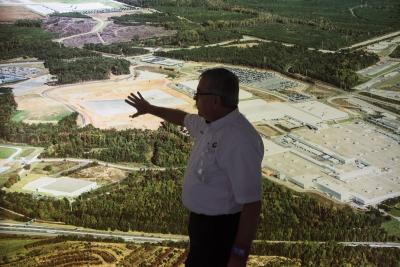Nanette Byrnes wrote this interesting and in-depth article on technology’s impact on industry and the way we work published in MIT Technology Review. Greenville, South Carolina, has bet its future on high-tech manufacturing. Who wins and who loses in this increasingly automated economy?
In the foothills of the Appalachian Mountains in a corner of South Carolina sits a town that should be economically dead. For decades, Greenville was the heart of the state’s textile industry—and its economic engine. First attracted by the area’s fast-moving rivers as a way to power looms, textile manufacturers employed tens of thousands of people here. Beginning in the 1970s, however, facing competition from lower-cost manufacturing regions like Mexico and Southeast Asia, these companies began to struggle. Over the next decades, many factories closed. Others moved production overseas. In 1990, 48,000 people still worked in textile manufacturing in the Greenville area, according to the U.S. Bureau of Labor Statistics. Today fewer than 6,000 do.
Yet Greenville is booming. Visit its pretty downtown and you will find runners pushing jogging strollers and tourists snapping shots from the pedestrian bridge across the Reedy River in Falls Park. On Main Street you can eat at nationally recognized restaurants. A flock of construction cranes spend the days erecting pricey new condominiums. In recent years, the city and its surrounding counties have benefited from large increases in tax revenue and improved funding for local schools.
An aerial view of the BMW plant in Greer, South Carolina. Already producing more cars than any other BMW factory, it is now adding a new body shop.While Charlotte, North Carolina, a 90-minute drive to the northeast, bet on financial services as the centerpiece of its economy, and other cities have tried to cultivate software hubs or tourism, Greenville has remained focused on manufacturing. Major global manufacturers with outposts here include BMW, ABB, Fluor, Michelin, Bosch, and General Electric’s power division. As local factories have adopted increasingly computerized and automated techniques, the region has evolved into one of the country’s leading centers of advanced manufacturing.
The payoff for Greenville has been a strong economy by many conventional measurements. Though it sank with the rest of the country during the recession, it has bounced back since. Unemployment today is below the national rate at 4.7 percent, and median household income and property values have risen in recent years. Between 2010 and 2014, $1.5 billion was invested in businesses in the county, which added 8,947 new jobs. New businesses are being created here faster than anywhere else in the southeastern U.S., according to data tracked by the South Carolina Department of Commerce.

